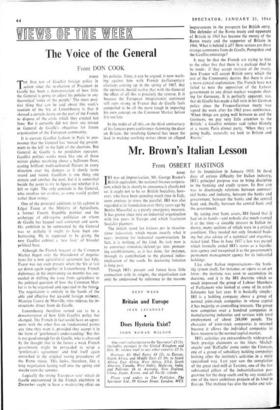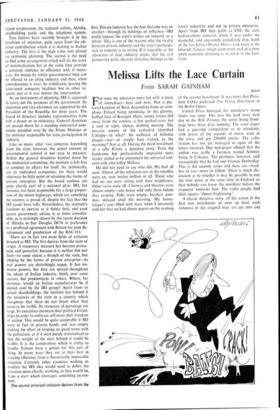Mr. Brown's Italian Lesson
From OSBERT HASTINGS
ROME
IRI was an improvisation. Mr. George Brown's British equivalent, the national finance corpora- tion,which he is shortly to announce,is clearly not so; it ought not to be so. British Socialists, how- ever, who have been spending much time in Italy, seem anxious to stress the parallel. IRI was also regarded at its foundation over thirty years ago by Benito Mussolini as a purely emergency measure. It has grown since into an industrial organisation with few peers in Europe and which fascinates Socialist planners.
The initials stand for Istituto per la ricostru- zione industriale, which means exactly what it says : institute for 'industrial reconstruction. In fact, it is nothing. of the kind. Its task now is to construct/stimulate/defend/go into pioneer- ing establishments, as it has done, for instance, through its contribution to the planned indus- trialisation of the south. Its doctoring function is long past.
Though IRI's present and future have little connection with its origins, the organisation can only be understood by reference to the reasons
for its foundation in January 1933. In those days of serious difficulty for Italian industry, IRI's principal purpose was to bring discipline to the banking and credit system. Its first aim was to disentangle relations between commer.: cial banks and industry, between the banks and government, between 'the banks and the central bank and, finally,' between the central bank and the government.
By taking over bank assets,. IRI found that it had on its hands—and nobody else much wanted it at the time—a sizeable interest in Italian in-: dustry, many sections of which were in a critical condition. They needed not only financial back- ing but also advice of a technical and organisa- tional kind. Thus in June 1937 a law was passed which formally ended IRI's status as a liquida: tion agency and recognised it as the government's. permanent management agency for its industrial holdings.
Like other Italian improvisations—the bank- ing system itself, 'for instance, or opera as an art fdtm—the institute was soon to accumulate its doctrine, and it is the IRI doctrine which so much impressed the group of Labour Members of Parliament who looked at some of its estab- lishments late last year. It is basically simple : IRI is a holding company above a group of normal joint-stock companies in whose capital it has majority or controlling interests. The group now comprises over a hundred companies in manufacturing industries and services with total employment of about 288,000 people. The character of joint-stock companies is retained because it allows the individual companies to have recourse to the normal capital market.
IRI's activities are extraordinarily widespread. Such prestige claimants as the liners 'Michel- angelo' and `Raffaello' come under the Finmare, one of a group of subsidiary holding compartieS looking after the institute's activities in a niOre specialised way. Last year saw the completion of the great steel mill at Taranto, one of the few substantial pillar's of the industrialisation pro- gramme for the deep south and by any standards one of the most ambitious projects of its kind in Europe. The institute has also the radio and tele- vision corporation, the national airline, Alitalia, shipbuilding yards and the telephone system.
Two factors have recently brought it to the forefront of attention, quite apart from the ob- vious contribution which it is making to Italian industry. The first is the high value now placed on economic planning. The second is the need to find some arrangement which will do the work of nationalisation but at the same time provide a constant stimulus to efficiency and, if neces- sary, the means by which governmental help can be offered to an ailing industry and then, when convalescence is over, be withdrawn, leaving the joint-stock company healthier but in other re- spects just as it was before the intervention.
As an instrument of planning, IRI is supposed to carry out the purposes of the government. Its chairman and vice-chairman are appointed by the President of the Republic for three years. The board of directors includes representatives from half a dozen or so ministries. General directives are passed down by a standing ministerial com- mittee presided over by the Prime Minister or the minister responsible for state participation in industry.
Like so many other vast concerns depending from the state, however, the actual amount of governmental control is not easy to measure. Within the general directives handed down by the ministerial committee, the institute is left free to conduct its affairs for itself. So, technically, are its individual companies, for there would otherwise be little point in retaining the forms of private enterprise. But the broad outlines are quite clearly part of a national plan; IRE,' for instance, has been responsible for a large propor- tion of the motor highways, which are something the country is proud of, despite the fact that the IRI roads have tolls. Nevertheless, the institute's freedom to operate as it thinks best, and even ignore government advice, is at times consider- able, as is strikingly shown by the recent decision of Alitalia to buy Douglas DC9s in preference to a proffered agreement with Britain for joint de- velopment and production of the BAC-111.
There are in fact two main fields of criticism directed at IRI. The first derives from the taint of origin. A temporary measure has become perma- nent and powerful; because it is neither fish nor fowl—to some extent a branch of the state, but abiding by the forms of private enterprise—its real powers are disturbingly vague. It has im- mense powers, but they are spread throughout the whole of Italian industry, thinly over some sectors, but predominant in others. Where, for instance, would an Italian manufacturer be if denied steel by the IRI group? Apart from its actual shareholdings, the institute has behind it the resources of the state in a country which recognises that these do not finish when they cease to be visible. Its resources of patronage are large. Its executives maintain their political friend- ships in order to cultivate still more their freedom of action. This would be quite acceptable if IRI were in fact in private hands and was simply making the effort of keeping on good terms with the politicians, or if it were purely nationalised so that the weight of the state behind it could be visible. It is the compromise which is tricky to handle. Italians have a genius for this sort of thing. In many ways they are at their best in coaxing efficiency from a theoretically impossible situation. Certainly other countries wishing to emulate the IRI idea would need to define the situation more clearly, working, as they would be, from a start which envisages something perma- nent.
The second principal criticism derives from the first. Private industry has the fear that one way or another—through its holdings or influence—IRI could impose the state's wishes on industry as a whole. This is one of the reasons why the rivalry between private industry and the state's participa- tion in industry is so strong. It is arguable, as the advocates of state industry argue, that the real pioneering work, the true initiative, belongs to the state's industries and not to private enterprise. Apart from IRI they point to EM, the state hydrocarbons concern, when it was under the masterful, and apparently completely free, hand of the late Enrico Mattei. Others look more at the inherent dangers which seem more real at a time when economic planning is so much to the fore- front.



































 Previous page
Previous page